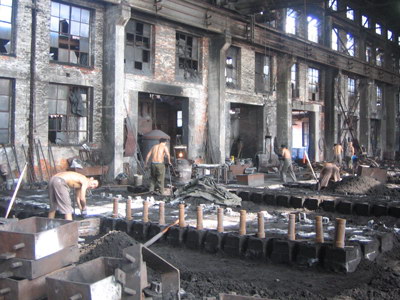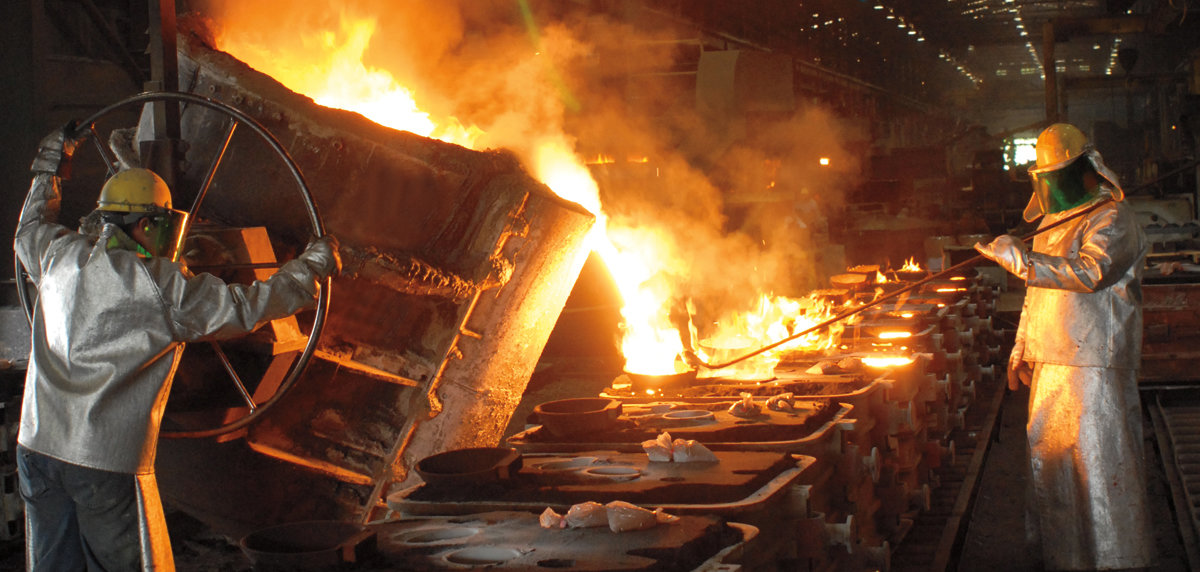Just How a Metal Foundry Contributes to Sustainable Metal Manufacturing Practices
Metal foundries play a crucial duty in advertising sustainability within the metal manufacturing sector. By incorporating recycled materials, they decrease dependence on virgin resources and minimize environmental effects. Energy-efficient melting procedures better reduce energy consumption and exhausts. The trip toward lasting methods involves even more than simply reusing and energy administration. It incorporates a more comprehensive commitment to moral sourcing and ingenious innovations. The ramifications of these methods are significant and warrant more detailed assessment.
The Duty of Recycling in Metal Foundries
While metal manufacturing has generally counted on virgin products, the raising focus on sustainability has actually resulted in a significant shift in methods, particularly in metal foundries. Recycling has actually emerged as an essential part of this improvement, allowing foundries to repurpose scrap metal and decrease dependence on mined resources. By incorporating recycled materials right into their processes, foundries not just decrease environmental effect but likewise lower production costs.
Using recycled metals, such as steel, aluminum, and copper, decreases energy intake and lowers greenhouse gas discharges connected with standard mining and refining techniques. Moreover, foundries can attain high-quality outputs by employing innovative sorting and handling modern technologies to assure the pureness of recycled products. This emphasis on recycling fosters a circular economy, where waste is reduced, and resources are utilized successfully. Subsequently, metal foundries play a pivotal duty in promoting lasting techniques within the metal production industry.
Energy-Efficient Melting Methods
Energy-efficient melting strategies are necessary for boosting sustainability in metal production. These techniques significantly lower power consumption during the melting process, which is one of one of the most energy-intensive phases in metal manufacturing. Technologies such as induction melting, resistance home heating, and microwave melting offer boosted effectiveness contrasted to typical methods. Induction melting, as an example, makes use of electro-magnetic areas to create warm straight within the metal, lessening energy loss and providing precise temperature level control.
Additionally, carrying out warm healing systems can further enhance effectiveness by reusing and catching waste warm created throughout melting. Using sophisticated insulation materials and maximizing furnace designs likewise add to power cost savings. By embracing these ingenious melting methods, metal foundries can lower their carbon impact, minimize operational expenses, and add to a much more lasting manufacturing landscape. The integration of energy-efficient techniques not only lines up with ecological goals yet also fulfills the growing demand for responsible production approaches in the metal industry.
Sustainable Sourcing of Raw Materials
Lasting sourcing of raw products is vital for lessening the ecological influence of metal production. This includes the increased utilization of recycled metals, the fostering of moral mining practices, and initiatives intended at regional sourcing. By focusing on these approaches, the market can advertise accountable source monitoring and assistance neighborhood economies.

Recycled Metal Application
Just how can markets properly minimize their environmental impact while meeting the expanding need for metal? One significant strategy is the application of recycled metal. By incorporating scrap metal into their production processes, foundries can lower the removal of virgin materials, thus saving natural sources and decreasing power usage. Recycled steels need much less power to procedure contrasted to their raw equivalents, leading to reduced greenhouse gas emissions. Furthermore, the use of recycled metal helps divert waste from land fills, advertising a circular economy. Industries that focus on recycled metal not only contribute to sustainability but likewise gain from cost financial savings connected with lowered product purchase. Consequently, recycled metal application stands as an important technique for ecologically responsible metal manufacturing.
Moral Mining Practices
While the need for metals proceeds to rise, markets are progressively recognizing the significance of honest mining techniques in making certain liable sourcing of basic materials. Honest mining encompasses a dedication to ecological stewardship, social responsibility, and adherence to fair labor practices. Firms are currently prioritizing collaborations with mines that demonstrate openness in their procedures, minimizing environmental impact and respecting neighborhood neighborhoods. This approach not just fosters a sustainable supply chain however additionally boosts the credibility of companies involved. By implementing extensive criteria and accreditations, industries can battle prohibited mining activities and advertise the welfare of workers. Inevitably, ethical mining techniques contribute markedly to a more sustainable metal production environment, aligning financial growth with ecological and social integrity.
Local Sourcing Efforts

Technologies in Metal Casting Processes
Developments in metal casting processes are changing the industry by including sophisticated recycling strategies that minimize waste. Energy-efficient melting methods are additionally being created to decrease power consumption during manufacturing. Additionally, using cutting-edge mold and mildew materials contributes to enhanced performance and sustainability in casting procedures.
Advanced Recycling Techniques
Advanced recycling strategies are transforming metal casting procedures, greatly enhancing sustainability in the industry. These developments concentrate on reclaiming and recycling scrap metal, significantly reducing waste and the requirement for virgin products. Strategies such as hydrometallurgy and pyrometallurgy make it possible for foundries to extract useful steels from utilized parts, making sure efficient source usage. Additionally, progressed sorting and purification modern technologies boost the top quality of recycled steels, making them ideal for high-performance applications. This not only minimizes the ecological footprint of metal manufacturing yet also promotes a circular economic climate by advertising the reuse of products. As these reusing techniques continue to evolve, they guarantee to better streamline procedures within foundries and add to a much more lasting metal manufacturing landscape.
Energy-Efficient Melting Methods
While typical melting techniques have long been the backbone of metal casting, current improvements have actually introduced energy-efficient methods that considerably decrease energy consumption and emissions. Technologies such as induction melting and electric arc heaters have gotten prestige, allowing for exact control over temperature and decreasing the requirement for fossil fuels. These techniques not only improve power effectiveness however likewise advertise much faster melting times, which equates to decrease operational prices. In addition, developments in heat healing systems enable foundries to capture and recycle excess heat generated throughout the melting procedure. This holistic technique to power administration not just sustains lasting methods but also settings metal foundries as leaders in the shift in the direction of greener production processes, better aligning with global sustainability goals.
Cutting-edge Mold Materials
As the need for more sustainable and efficient metal casting procedures expands, the expedition of ingenious mold and mildew products has ended up being a focal point in the market. Traditional mold materials frequently add to ecological difficulties, prompting the look for options that reduce waste and power intake. Current improvements consist of the growth of recyclable composites and biodegradable binders, which not just boost mold and mildew performance however also reduce environmental impact. Additionally, the usage of 3D printing modern technology in mold and mildew creation enables for detailed styles that decrease material usage and allow rapid prototyping. These innovative products not just boost casting accuracy however additionally line up with sustainability goals, showcasing the industry's commitment to decreasing its carbon impact while preserving top notch production requirements.
Minimizing Waste With Advanced Modern Technology
Ingenious technologies are changing the metal manufacturing sector by substantially minimizing waste and improving efficiency. Advanced information analytics and equipment learning algorithms make it possible for foundries to enhance manufacturing processes, decreasing and identifying inadequacies scrap product. Smart sensing units keep track of tools performance in real-time, allowing for anticipating upkeep that reduces downtime and waste generation. In addition, additive production techniques, such as 3D printing, permit for the creation of facility elements with very little material use, substantially reducing waste contrasted to standard methods.
Additionally, closed-loop systems are coming to be a lot more widespread, in which scrap metal and by-products are reused back into the production cycle, ensuring that products are used to their maximum capacity - Aluminum Foundry. This assimilation of technology not only promotes source conservation but additionally enhances the general sustainability of metal manufacturing techniques. By embracing these advancements, foundries can add to a much more lasting future while preserving competitiveness in the marketplace
The Effect of Foundries on Carbon Footprint Decrease
Foundries play an essential role in lowering the carbon impact of the metal manufacturing industry by executing various lasting practices. By utilizing energy-efficient innovations, such as electric arc furnaces, these centers significantly reduced greenhouse gas emissions contrasted to typical techniques. Furthermore, foundries increasingly adopt eco-friendly energy sources, which additionally diminishes their dependence on nonrenewable fuel sources.
Reusing scrap metal is another important practice that foundries employ, conserving sources and lowering the requirement for virgin materials. This not only decreases waste yet also lowers the energy-intensive removal procedures related to mining. In addition, the fostering of closed-loop water supply helps to minimize water use and decrease wastewater discharge, adding to an extra lasting procedure.
With these initiatives, foundries demonstrate their commitment to ecological stewardship, leading to a marked reduction in the total carbon impact of the metal production field. Their recurring efforts are essential in the change toward an extra sustainable industrial landscape.
Often Asked Concerns
What Kinds of Metals Are The Majority Of Commonly Recycled in Foundries?
Aluminum, brass, copper, and steel are amongst the most commonly recycled metals in foundries. These metals are preferred as a result of their high recycling rates, financial worth, and prevalent accessibility, adding significantly to commercial sustainability efforts.
Just How Do Foundries Guarantee the Quality of Recycled Materials?
Foundries determine the high quality of recycled products with rigorous screening, arranging, and purification processes. They carry out advanced innovations to evaluate structure and remove impurities, assuring that the recycled steels fulfill market requirements for efficiency and safety and security.
What Accreditations Exist for Lasting Foundry Practices?
Various qualifications exist for sustainable foundry methods, consisting of ISO 14001 for ecological management, ISO 50001 for power monitoring, and LEED certification for sustainable structure methods (Aluminum Foundry). These certifications aid ensure adherence to environmental and sustainability standards in operations
How Do Foundries Measure Their Carbon Footprint Reduction?
Foundries determine carbon footprint reduction via tools like lifecycle assessments, power audits, and emissions tracking systems. They compare baseline discharges to existing outcomes, evaluating renovations in energy effectiveness, product use, and renewable resource fostering with time.
What Are the Financial Benefits of Lasting Metal Manufacturing?
Sustainable metal production uses economic benefits such as lowered functional costs, raised performance, enhanced market competition, and possible federal government incentives. Furthermore, it cultivates innovation and brings in eco conscious consumers, eventually driving lasting earnings for services.
Metal foundries play a crucial function in advertising sustainability within the metal manufacturing industry. While metal production has typically relied on virgin products, the raising focus on sustainability has actually led to a substantial change in techniques, specifically in metal foundries. By integrating scrap metal right into their production processes, foundries can lower the extraction of virgin products, consequently preserving natural resources and lowering power consumption. Foundries play a crucial duty in lowering the carbon footprint of the metal production industry by executing different lasting methods. Reusing scrap metal is an additional crucial practice that foundries utilize, preserving resources and decreasing Aluminum Foundry the requirement for virgin products.